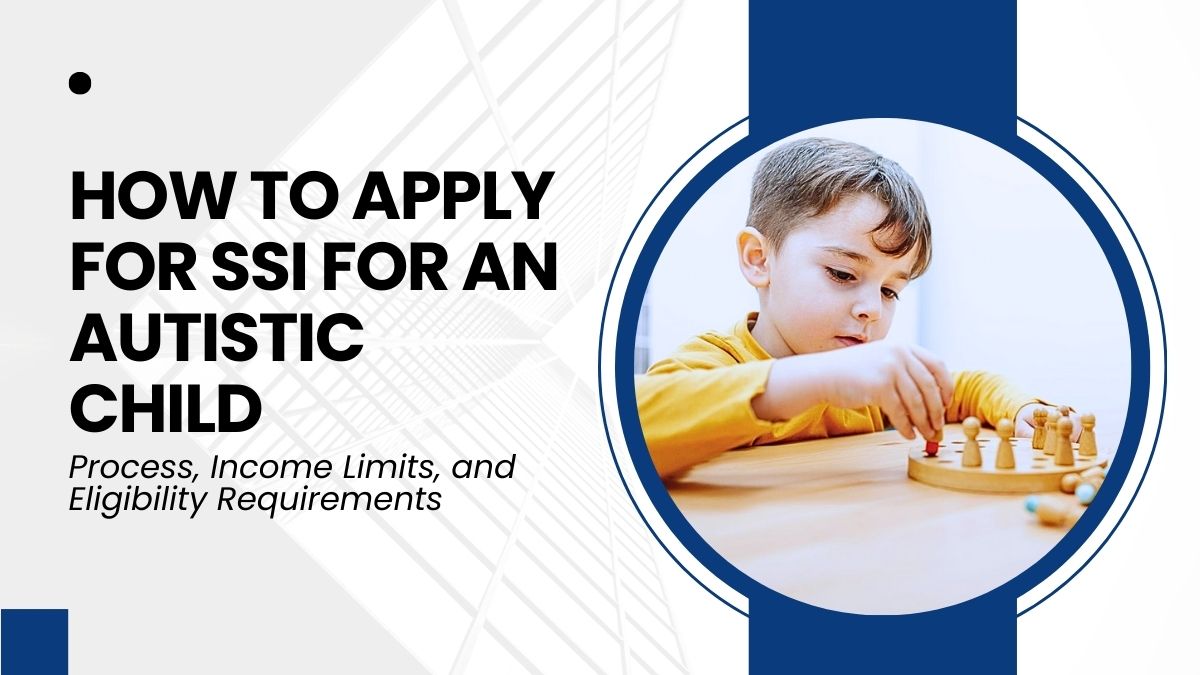Caring for a child with autism can be a rewarding yet challenging journey, particularly when it comes to managing the financial aspects. For families with limited income, the Supplemental Security Income (SSI) program can provide vital financial support, helping to ease the burden of expenses associated with therapies, treatments, and other care needs.
Knowing how to qualify for and apply for SSI benefits is crucial for parents and caregivers of autistic children.
SSI Overview
The SSI program, administered by the Social Security Administration (SSA), provides monthly payments to families raising children with disabilities, including Autism Spectrum Disorder (ASD). These payments can be instrumental in covering basic needs and supporting various therapies and treatments.
To access these benefits, families must meet specific medical and financial eligibility criteria set by the SSA. Autism is recognized as a qualifying condition, but the severity of the disability must be demonstrated through comprehensive documentation.
Medical Criteria
The SSA has outlined clear medical criteria that must be met to qualify for SSI benefits for a child with autism. These criteria focus on the severity of the child’s disability in terms of social interaction, communication, and behavior patterns.
Social Interaction
One of the primary criteria is a significant deficit in social interaction. This means your child must have considerable difficulty in engaging with others. For instance, children with autism may struggle to make eye contact, share interests, or understand social cues.
Communication
The child must also exhibit substantial limitations in both verbal and nonverbal communication. This includes difficulties in understanding and using spoken language, gestures, facial expressions, and other forms of communication.
Behavior Patterns
Another critical criterion is the presence of restricted and repetitive patterns of behavior. This could involve limited interests, repetitive actions, or strict adherence to routines, which are common characteristics in children with autism.
In addition to these core areas, the SSA requires evidence of an extreme limitation in at least one of the following functional domains:
- Using Information: This refers to the child’s ability to learn, remember, follow instructions, solve problems, and make decisions.
- Interacting with Others: This involves the ability to engage with peers, maintain friendships, and understand social dynamics.
- Focusing on Activities: The child must show difficulty staying focused on tasks, avoiding distractions, and completing activities on time.
- Adapting or Managing Oneself: This includes regulating emotions, controlling behavior, and maintaining personal hygiene.
Providing thorough medical documentation that supports your child’s challenges in these areas is essential for a successful SSI application.
Financial Eligibility
Financial eligibility is another crucial component of the SSI application process. The SSA imposes income limits that families must meet to qualify for benefits. These limits vary depending on the number of income earners and children in the household.
Parents must provide proof of income, such as W-2 forms or federal tax returns, for all wage-earning adults in the household. It’s important to know that the SSA calculates benefits based on the household’s income and applies necessary deductions according to their formula.
Applying for SSI Benefits
Applying for SSI benefits for your autistic child can be a time-consuming process, but starting early can make a significant difference. The first step is to schedule an appointment at your local SSA office. Before your meeting, review the SSA’s Child Disability Starter Kit, which outlines the documentation you’ll need.
Each application is evaluated individually, with the SSA considering the specific circumstances of your family. The amount of financial assistance awarded varies, depending on factors such as household income and the severity of the child’s disability.
While the process can be overwhelming, being well-prepared and knowing the requirements can help increase the chances of securing the benefits your child needs.
By ensuring you have all necessary documentation and meet the SSA’s medical and financial criteria, you can improve the likelihood of obtaining crucial financial support that can greatly assist in your child’s care and development.
FAQs
What is the SSI program for autism?
SSI provides financial support for low-income families with disabled children, including those with autism.
What medical criteria must be met for autism SSI benefits?
Significant deficits in social interaction, communication, and behavior patterns are required.
What financial proof is needed for SSI?
Proof of income, such as W-2 forms or tax returns, is required for all household earners.
How does the SSA calculate SSI benefits?
The SSA calculates benefits based on household income, applying specific deductions.
What should I do before applying for SSI?
Review the SSA’s Child Disability Starter Kit and gather necessary documentation.
















